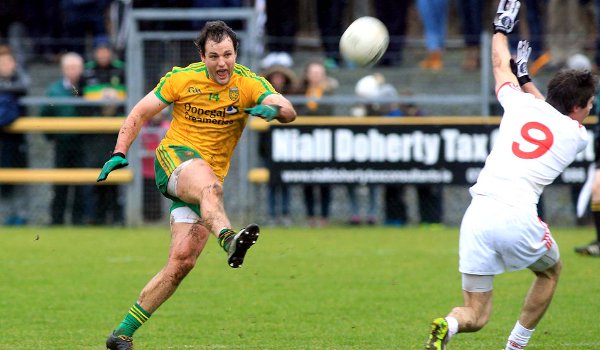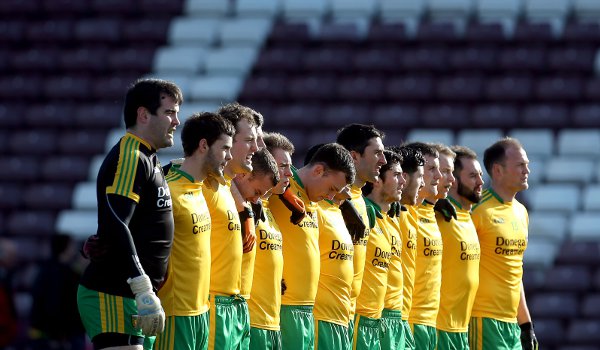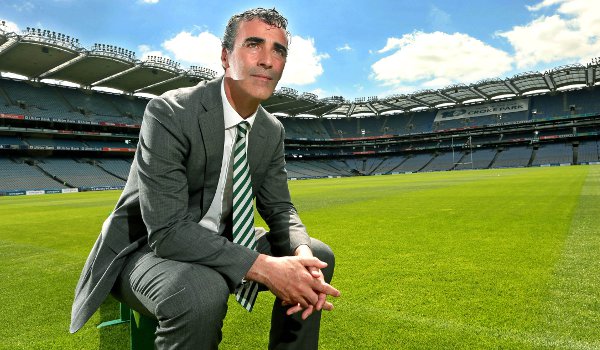A LOW summer sun glinted off the windows of the Donegal team bus as it made its way through the town centre.
Less than 10 months earlier, crowds had queued in the rain – like Garth Brooks fans scrambling for a ticket – to welcome their heroes home.
But that was then. Times had changed. A team which comfortably beat Mayo in the 2012 All-Ireland final and now lost to the same opponents by 16 points. Their title was gone and so was their aura.
Crowned kings of Ireland after an epic journey had taken them from no-hopers to champions, they listened to the talk of how they would dominate the football landscape for the rest of the decade and swallowed up the hype.
“We want to be like Tyrone and leave that kind of legacy,” said their captain, Michael Murphy.
Instead, they started being like Donegal again – the old Donegal who won the 1992 All-Ireland and then disappeared from view, never to be seen at Croke Park in September again until Jim McGuinness came along and convinced a team of non-believers that they could beat anyone.
By August last year, though, the flock could no longer hear the missionary’s voice. While Mayo played exceptionally well in that All-Ireland quarter-final, Donegal were awful and the Irish Sun’s following day headline summed up the journey the team had taken. “Champs become Chumps.”
Inevitably a post-mortem followed and in a winter of discontent, McGuinness parted company with his trusty backroom team, including – most significantly of all, his sidekick Rory Gallagher, the innovative tactician who devised the game-plan which saw them reach the mountain top.
Now, it’s February and unlike last year, Donegal are treating the League seriously, scoring 2-19 against Laois on the opening day of the season, the highest score they have ever registered under McGuinness’ management.
Yet while they insist their focus is all on 2014, the 2013 meltdown has left doubts in several people’s heads. If – as they insist – last season was a blip then why did it all turn so sour?
 Donegal captain Michael Murphy
Donegal captain Michael MurphyToo much emphasis had been placed on the Tyrone game. In the week leading up to that Ulster quarter final, McGuinness spoke decisively about putting 2012 to bed.
Yet it seemed a case of the manager doth protest too much. After all, they had been relegated from Division One of the League and when the rent-a-quote brigade was asked to deliver their 2013 predictions, Donegal’s chances were routinely dismissed.
“Nobody gave us a chance last year either,” said McGuinness last May. “Focus is vitally important and we’re very lucky that we have a focused group that want to achieve. It’s not like they fired in the towel when they were collecting the cup, going ‘thank God we’re over the line’.
“The hardest part is making the initial breakthrough, because there are confidence issues there. Once you know you’re good enough, a lot of the baggage can be put to the side. So the Tyrone draw is a focuse for us. It put 2012 to bed straightaway. This is special. It’s something the players will remember for the rest of their lives.”
Special? An Ulster quarter-final? It certainly was not. Donegal played reasonably well that day, staging a second half rally which ground Tyrone down. Yet it only put them in the Ulster semis where three other teams, including eventual champions Monaghan, were waiting, having endured considerably less mental anguish along the way.
Between them McGuinness and Rory Gallagher watched Tyrone five times in the flesh between the McKenna Cup and the League. Were Monaghan watched at all before the Ulster Championship? If they weren’t that was forgivable because Monaghan hadn’t won Ulster since 1988 and appeared to be a team going nowhere.
And Donegal underestimated them, training too hard in the week of the Ulster final, before being caught on the hop. All of a sudden, they were back on the road, heading to Leitrim the following Saturday for a qualifier against Laois and then onto Croke Park a week later for the quarter-final against Mayo.
 McGuinness will be hoping to take his Donegal side back to the top
McGuinness will be hoping to take his Donegal side back to the top“We just didn’t have it our legs,” said Karl Lacey. “We didn’t have the speed or the sharpness. We were looking over at the sideline and asking Jim ‘what the hell is going on here?’
“Jim didn’t have the answers. Our hunger was questioned but the hunger was definitely there. We wanted it.”
But not as much as a year previously.
In 2012, the health reports were consistently positive. Key players stayed fit but by the spring of 2013 all this had changed. Lacey had a hip problem which forced him out of the League. A subsequent knee injury reduced his game-time in the Championship.
And without Lacey, Donegal were missing their best defender. Plus, by the time the Mayo game came around, Mark McHugh was out with concussion. “I think, in all, we had seven players who needed operations last year,” said McGuinness.
And while he had a squad of 30, half of those were numbers rather than big-game players. In short, Donegal lacked depth and without McHugh and Lacey – the two lynchpins of their defined counter-attacking strategy, they were exposed for having a great team rather than a great squad.
By half time of their quarter-final, Mayo led Donegal by 12 points – Lacey asked to enter the fray in the 23rd minute. “We were six or seven points down by the time I was asked to warm up and it wouldn’t have mattered if you were Superman at that stage,” he says. “I don’t think it was going to make any difference who came on. It was just about doing the best we could.”
Significantly, though, the towel was thrown in.
“Half-time and I remember Jim was saying, ‘we are still in this’. He still had the belief but you could see in guys eyes that they were thinking, ‘how the hell are we going to get back?’
That was disappointing.”
Within two months of guiding his county to their second All-Ireland, McGuinness landed a dream job in Glasgow, as a performance consultant - or sports psychologist in layman’s terms.
Surely this double-jobbing distracted Donegal in 2013? Surely burning the candle at both ends was detrimental to their chances?
McGuinness insists not. As a father of three young kids, Toni-Marie, Michael Anthony and Jim Jr, he and his wife, Yvonne, were expecting twins throughout the 2013 Championship.
And yet, each week, he commuted weekly to Glasgow from Donegal, attending as many county training sessions in 2013 as the year previously. But still, surely being at Celtic was the problem?
 McGuinness is a performance consultant at Celtic FC
McGuinness is a performance consultant at Celtic FC“Not at all,” said McGuinness. “In many respects, I don’t have a real job. I’m working in sport. There are people getting up at 6.30am, who do a full day’s work, get changed and go to county training.
“My life is working in a professional sporting environment a couple of days a week, coming home and working with the Donegal team.
“You could be in a bank – or the bog! – and in something very different from sport.
“But I think I’m in a privileged position because I’m thinking in that space all of the time.
“The three things in my life are my family, Donegal and Celtic. And I don’t prioritise one over the other.
“I give it absolutely everything in all of them.
“When you have young kids, you want to spend as much time as possible with them.
“I’m lucky in that, in the days I’m off, I’m with them all day. There are other parents that don’t have that luxury. It’s not the worst situation in the world.”
To the outsider, it seems as if the Celtic job did distract. After all, they were brilliant in 2012 before he got the post, and relegated and dumped out of the Championship whenever he joined Celtic’s payroll.
And yet, his words and prior success buys trust. Donegal, after impressing in the first two years of his tenure, were allowed an off-year, especially one hit by injuries. Should they fail again, though, then the Celtic questions will return.
The League started positively. The big hitters – Lacey and McHugh, Paddy McGrath, Christy Toye – are back.
“Last year we are losing men, now we are getting them out with us again,” said McGuinness. “We need to manage them and not overcook them.”
Plus, the team have bought back into McGuinness’ thoughts. Gallagher’s absence is felt but players, by their nature, are selfish and have moved on. A key factor in the rehab process was a team meeting Michael Murphy called just weeks after the Mayo loss.
“If you look at the harsh reality, we came up short by a huge distance last year,” said Murphy, “and we had to ask ourselves why we had to look at such a lopsided scoreline. In the meeting, we identified areas to improve on and hopefully we can bring the answers to the table this season.
“We’re coming into 2014 fresh and want to have the same longevity as counties like Dublin, Tyrone, Kerry, Cork and Mayo – teams who can keep going back to the well season after season.
“After a big defeat – like we had against Mayo - it is hard to come back. But the feedback off everybody was very positive.
"We were hurt but we don’t want to end on a note like that after giving it our all for a few seasons. The squad want to drive on. This year is about putting things right.”

